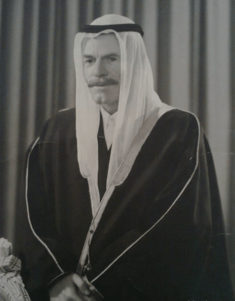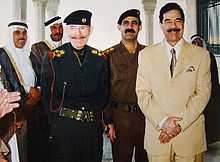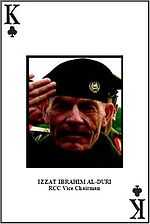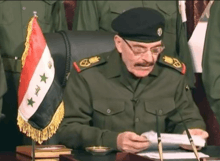Izzat Ibrahim al-Douri
| Izzat Ibrahim al-Douri عزت ابراهيم الدوري | |
|---|---|
 | |
| Portrait of Izzat Ibrahim al-Douri | |
| Leader of the Iraqi Ba'ath Party | |
| In office 3 January 2007 – 17 April 2015 | |
| Preceded by | Saddam Hussein |
| Deputy Secretary of the Regional Command of the Iraqi Regional Branch | |
| In office September 1991 – 3 January 2007 | |
| Preceded by | Taha Yassin Ramadan |
| Succeeded by | Unknown |
| Vice Chairman of the Revolutionary Command Council | |
| In office 16 July 1979 – 9 April 2003 | |
| President | Saddam Hussein |
| Preceded by | Saddam Hussein |
| Succeeded by | Post abolished |
| Member of the Regional Command of the Iraqi Regional Branch | |
| Incumbent | |
| Assumed office October 1966 – 9 April 2003 | |
| Personal details | |
| Born | 1 July 1942 Ad-Dawr, Saladin Province Kingdom of Iraq |
| Died | April 17, 2015 (aged 72) Tikrit, Iraq (allegedly) |
| Nationality | Iraqi |
| Political party | Iraqi Ba'ath Party |
| Religion | Islam (Naqshbandi)[1] |
| Military service | |
| Allegiance | |
| Service/branch | Iraqi Army
(Before Invasion of Iraq) |
| Years of service | 1962–2003 2006–2015 |
| Rank | |
| Unit | Political Guidance Directorate (Before Invasion of Iraq) |
| Commands | 2nd Infantry Division (1977–1981) Leader of the Naqshbandi Army (2006–2015) |
| Battles/wars | Iran-Iraq War
1991 Iraq War 1991 uprisings in Iraq |
Izzat Ibrahim al-Douri (Arabic: عزت ابراهيم الدوري ‘Izzat Ibrāhīm ad-Dūrī; 1 July 1942 ) is an Iraqi general and a commander of the Army of the Men of the Naqshbandi Order. He was an Iraqi military commander and Army vice chairman of the Iraqi Revolutionary Command Council until the 2003 U.S.-led invasion of Iraq.[2][3]
Al-Douri was the most high-profile Ba'athist official to successfully evade capture after the 2003 invasion of Iraq, and was the king of clubs in the infamous most-wanted Iraqi playing cards. Al-Douri continued to lead elements of the Iraqi insurgency such as the Ba'athist Army against the then-occupation forces and waged an insurgency against the current regime in Baghdad. Following the execution of former President Saddam Hussein on 30 December 2006, al-Douri was confirmed as the new leader of the banned Iraqi Ba'ath Party on 3 January 2007.[4] Al-Douri was reportedly killed in action—along with his nine bodyguards[5]—on 17 April 2015 in a large-scale military operation by Shiite militias and Iraqi forces near the Al-Alaas oil fields in Hemreen east of Tikrit.[6][7][8][9][10] The Shiite militant organization Asa'ib Ahl al-Haq has alleged to have killed him and said that his body is being transported to Baghdad to confirm the identity of the body.[11][5] According to the BBC, Shiite militias claimed to have 'killed' him, the Iraqi Baath party denies his death, his death has not been confirmed.[12] A Kurdish news source also reported that Iraq did not have al-Douri's DNA to confirm his death [13]
Biography
Youth
Born in 1942, al-Douri began his life in his hometown of Ad-Dawr, near the Iraqi town of Tikrit. He came from an impoverished background, with his father being an Ice-seller, and became involved in revolutionary politics in his late teenage years. He worked alongside Saddam Hussein. Both served in the early intelligence apparatus of the Ba'ath Party and participated in what would be known as the 17 July Revolution in 1968.[14][15]
During the Ba'ath Regime

Al-Douri was a senior member of the Ba'athist government under Saddam Hussein. This was due to the fact that both al-Douri and Hussein came from the same Tikriti tribal background. He became the vice chairman of the Iraqi Revolutionary Command Council prior to 2003, giving him unprecedented amounts of power and influence within the Iraqi political sphere.[2][3]
As vice chairman of the Revolutionary Command Council, al-Douri was involved in the wars against Iran and Kuwait. He was complicit in the invasion of Saudi Arabia and the attack on the town of Khafji in January 1991.[16]
In 1993, al-Douri was involved in the state-sponsored Return to Faith Campaign (al-Hamlah al-Imaniyyah), which sought to encourage devotion to Islam in Iraqi social life. This saw aspects of Islam fused into the Iraqi media, education system and judicial system.[17]
On 22 November 1998, al-Douri escaped an assassination attempt when visiting Karbala.[18]
Al-Douri, a member of the Naqshbandi Order, was able to use his position in the regime to leverage support to the Naqshbandi community within Iraq. This form of patronage would eventfully culminate in the rise of the Army of the Men of the Naqshbandi Order during the Iraqi insurgency, of which al-Douri would play a leading role.[19]
Personal life
In a sign of loyalty, al-Douri consented to marry his daughter to Hussein's eldest son, Uday Hussein. Al-Douri’s influence with Hussein was so substantial that he could even levy a condition, that the union would not be consummated, and later made a successful petition that his daughter be permitted to divorce Uday.[20]
Al-Douri is believed to have suffered from leukemia and was said to have undergone blood transfusions every six months. In 1999, he visited Vienna, Austria for treatment. The Austrian opposition demanded that he be arrested for war crimes, but the government allowed him to leave the country.[21][22]
Fall of the Ba'ath regime and disappearance
The 2003 invasion of Iraq

At the time of the invasion of Iraq, al-Douri, along with President Saddam Hussein and Vice President Taha Yassin Ramadan, was among the three surviving plotters who had brought the Ba'ath Party to power in a coup in 1968.[3]
On 20 March 2003, U.S.-led coalition forces invaded Iraq, leading to the toppling of the regime of President Saddam Hussein on 9 April 2003. Following the fall of Baghdad, al-Douri went into hiding. U.S. officials claimed that he was involved in the subsequent Iraqi insurgency against U.S. forces, directing and funding attacks, as well as brokering an alliance between Ba'athist insurgents and militant Islamists. In November 2003, the U.S-led coalition issued a U.S $10 million bounty for any information leading to al-Douri's apprehension by authorities in response to coordinating attacks against coalition forces. He was made the King of Clubs in the infamous Most-wanted Iraqi playing cards, making him the 6th most wanted member in Saddam Hussein's regime. [23]
In a June 2008 interview, al-Douri detailed his strategy, indicating that "any negotiations with the invaders without it represents a desertion and treason, and is refused by all national, Pan-Arab and Islamic factions of the resistance."[24] During the interview, al-Douri made the following demands:
- An official pronounced recognition of the armed and unarmed national resistance, including all its factions and (political) parties, as the sole legitimate representative of the people of Iraq
- An official declaration of unconditional withdrawal from Iraq by the U.S. leadership
- Declaring null and void all the political and legislative institutions, as well as all the laws and legislation issued by them, since the occupation, with the de-Ba'athfication law in the forefront, and compensating all who were adversely affected by them
- A stop to raids, prosecutions, arrests, killings and displacement
- Release of all prisoners of war (POWs), prisoners and detainees without exception and compensating all for their physical and psychological damage
- Reinstating the army and the national security forces in service in accordance with their preoccupation laws and regulations, and compensating all who were adversely affected by dissolving them
- A pledge to compensate Iraq for all the material and moral losses it incurred because of the occupation
Al-Douri was reportedly the head of the Iraqi rebel group Army of the Men of the Naqshbandi Order as well as the Supreme Command for Jihad and Liberation based on his longstanding positions of leadership in the Naqshbandi sect in Iraq.[25] In 2009, General David Petraeus, who was at the time heading the United States Central Command, told reporters from Al Arabiya that al-Douri was residing in Syria.[26]
Iraqi insurgency and resurfacing

On 10 November 2011, a man claiming to be Izzat Ibrahim al-Douri released an audio tape condemning a recent arrest campaign targeting suspected Ba'ath Party members.
The first visual evidence of his survival surfaced on 7 April 2012 when a video posted online[27] showed him giving a speech. In the shots, he is seen wearing an olive military uniform and glasses, denouncing the Shiite-led government in Baghdad and interference in Iraqi politics by regional Shia powerhouse Iran. "Everyone can hear the sounds of danger echoing daily and threatening this country," al-Douri says during the hour-long broadcast. Prime Minister Maliki's personal adviser, Ali al-Moussawi, said the tape had a propaganda function but that he doubted al-Douri was still in Iraq as he required extensive medical care for a number of illnesses.[28]
One Iraqi MP stated that he believed al-Douri was residing in Qatar.[29]
On 5 January 2013, a 53-minute video was released on YouTube in which al-Douri encouraged recent Sunni protests in Nineveh and Anbar provinces against Prime Minister Nuri al-Maliki, saying that "the people of Iraq and all its nationalist and Islamic forces support you until the realization of your just demands for the fall of the Safavid-Persian alliance." The message, which showed the Ba'athist leader sitting behind a desk with a small Saddam era flag on it, was partially broadcast on the Al Arabiya news channel. In the video, released just before the Iraqi Army Day on 6 January, Douri claimed to be somewhere in Iraq's Babil Province.[30][31] Hours after the tape was released, Iraqi military intelligence arrested Abdul Rahman Mohammed Ibrahim, the nephew of al-Douri, in Saladin Province.[32]
In April 2013, the Iraqi government claimed to be closing in on al-Douri, who they claimed was moving between Tikrit and the towns of Hawija and Dour, which is alleged to be an area of strong support for al-Douri, and also where he is claimed to have owned a villa.[33]
A report surfaced in June 2013 of former Iraqi Ba'ath officials supplying the chemical weapon Sarin to the Al-Nusra Front through former Iraqi Military Industries' Brig. Gen. Adnan al-Dulaimi. The report detailed how "several former Iraqi military engineers trained the al-Nusra Front on how to use these chemical weapons,” adding that all plans in this connection were prepared by al-Dulaimi and staged after al-Douri's approval. The sourcing of this report was said to be an aide to al-Douri.[34]
The fall of Mosul and rise of ISIL
Al-Douri played a role in the Northern Offensive as commander of the Naqshbandi Army. Reports soon surfaced that he had links with the jihadist group ISIL, helping them take the city of Tikrit and coordinating attacks against Iraqi security forces.[35] On June 13, a twitter account, @wikibaghdadi, claimed a "Meeting between ISIS and Naqshbandi Army near al-Qayara area south of Mosul had taken place with representatives from Izzat Ibrahim al-Douri and Abu Bakr al-Baghdadi.”[36] In July 2014, al-Douri issued an audio recording praising “the heroes and knights of al Qaeda and the Islamic State” forces in attacking Iraqi government positions within Saladin, Kirkuk, Diyala and Nineveh province. His connections with Islamist elements in Iraq is said to have emerged as far back as during Saddam's regime.[37]
Al-Douri has been pointed out as one of the main commanders responsible for successful takeover by rebel groups of North Iraq and the city of Mosul in June 2014.[38] The Naqshbandi Army, along with other groups led by former Ba'ath officers, are reported to have assumed an increasingly large role in the governance and administration of occupied cities. Militants were reported to have appointed fellow Ba'ath generals Azhar al-Obeidi and Ahmed Abdul Rashid as the governors of Mosul and Tikrit.[39] Shortly afterwards, reports emerged that the Ba'ath Party, under al-Douri's leadership, declared war on fellow rebel group ISIL.[40] Other reports still maintain a certain degree of cooperation between the two groups.[41] Through information gathered from contacts with Sunni rebels and ISIL, it appears that a deal was struck in September 2014 aimed at reconciliation between ISIL and the Naqshbandi Army. In Anbar, Salaheddin and Diyala provinces the main rebel groups, the Naqshbandi Army the Mujahedeen army and Ansar al-Islam have pledged allegiance to ISIL and are being supplied with weaponry, equipment and money by ISIL.[42]
Allegations of death
On 17 April 2015, al-Douri was alleged to have been killed during a military operation conducted by the Iraqi Army near Al-Alaas oil fields in Hemreen, east of Tikrit. Iraqi security forces and Shia militias opened fire at a convoy carrying al-Douri and nine bodyguards, resulting in a 25 minute firefight. General Haider al-Basri, a senior Iraqi commander, announced to state TV that both al-Douri and his guards were killed. [43][7][8][9][10] The Shi'ite militant organization Asa'ib Ahl al-Haq has claimed to have killed him and said that his body is being transported to Baghdad to confirm the identity of the body.[5][44] Before delivering the body to Baghdad, Shi'ite militias did the DNA tests on the body and confirmed the results on 19 April.[45] The body was delivered to Baghdad on 20 April,[46] with the government starting the DNA tests a day after, on 21 April.[47] The governor of Salahaddin province, Raed al-Jabbouri, said that al-Douri was a “mastermind of Islamic State in Iraq (ISIS)” and that his death would be a blow to the group.[48]
On 24 April, The Iraqi Health Ministry spokesman Dr. Ziyad Tareq said: "The ministry does not have any DNA test (results) for any relative of Duri at the present time, and further efforts will be made to achieve a DNA result."[49][50][51]
References
- ↑ "The JRTN Movement and Iraq’s Next Insurgency". Combating Terrorism Center at West Point.
- ↑ 2.0 2.1 "Saddam's No. 2 seeks help for insurgency". USA Today. 27 March 2006.
- ↑ 3.0 3.1 3.2 "Izzat Ibrahim Al-Douri / Izzat Ibrahim Al-Douri". Global Security.
- ↑ "Saddam aide is new Ba'ath leader", BBC News, 3 January 2007.
- ↑ 5.0 5.1 5.2 "Saddam Hussein's former top aide killed in Iraq military operation". foxnews.com. 17 April 2015. Retrieved 17 April 2015.
- ↑ "Top Saddam aide Izzat al-Douri reportedly killed". IBTimes. 17 April 2015.
- ↑ 7.0 7.1 "مقتل عزة الدوري في عملية عسكرية بحمرين شرق تكريت" (in Arabic). Skypressiq.net. 17 April 2015. Retrieved 18 April 2015.
- ↑ 8.0 8.1 "تضارب الأنباء حول مقتل عزت الدوري (صور)" (in Arabic). RT.com. 17 April 2015. Retrieved 18 April 2015.
- ↑ 9.0 9.1 "أنباء عن مقتل عزت الدوري شرق تكريت (صور)" (in Arabic). Erem News. Retrieved 18 April 2015.
- ↑ 10.0 10.1 "الجبوري يعلن مقتل عزت الدوري بعملية أمنية شرقي تكريت" (in Arabic). algahadpress.com. Retrieved 18 April 2015.
- ↑ "العصائب تتبنى عملية قتل عزت الدوري وتؤكد أن الجثة في طريقها لبغداد" (in Arabic). sotaliraq.com. Retrieved 18 April 2015.
- ↑ "Saddam aide Izzat Ibrahim al-Douri 'killed' in Iraq". BBC news. 17 April 2015.
- ↑ http://rudaw.net/english/middleeast/iraq/250420153
- ↑ Michael Knights. "Izzat Ibrahim al-Douri: Is Saddam Hussein's Pal Key to Stopping ISIS? – The New Republic". The New Republic. Retrieved 26 December 2014.
- ↑ "King of Clubs Izzat Ibrahim al-Douri: Saddam's ally and enforcer". BBC. 17 April 2015. Retrieved 20 April 2015.
- ↑ "Izzat Ibrahim Al-Douri / Izzat Ibrahim al-Duri". Retrieved November 2014.
- ↑ "Izzat Ibrahim Al-Douri / Izzat Ibrahim al-Duri". Global Security. Retrieved 7 April 2015.
- ↑ "Izzat Ibrahim Al-Douri / Izzat Ibrahim al-Duri". Retrieved November 2014.
- ↑ "ISIS: Inside the Army of Terror". Retrieved 7 April 2015.
- ↑ "Saddam Hussein's Faithful Friend, the King of Clubs, Might Be the Key to Saving Iraq". New Republic. 24 June 2014. Retrieved 8 April 2015.
- ↑ "Izzat Ibrahim Al-Douri / Izzat Ibrahim al-Duri". Global Security.org. Retrieved November 2014.
- ↑ "Izzat Ibrahim al-Douri: the King of Clubs is back, and he may yet prove to be Saddam Hussein's trump card". The Daily Telegraph. Retrieved 2013.
- ↑ "$10 Million Reward For Saddam's Number Two". http://www.rense.com/general44/10m.htm''. 19 November 2003. Retrieved 20 April 2015.
- ↑ Nasser, Nicola (10 June 2008). "Izzat Ibrahim Al-Douri Outlines Anti-US Strategy, Tactics of Resistance, an Interview Translated". Cross-Cultural Understanding.
- ↑ "The JRTN Movement and Iraq’s Next Insurgency". Combating Terrorism Center at West Point.
- ↑ "US giving security support to Yemen: Petraeus". Al Arabiya. 13 December 2009.
- ↑ "Al-Douri's full statement on YouTube (arabic)".
- ↑ "Iraq: Video appears to show top Saddam deputy". Google News.
- ↑ http://english.farsnews.com/newstext.php?nn=9101141223
- ↑ "Baath Leader Urges Sunnis to Protest Iraqi Premier". New York Times.
- ↑ "Fugitive Saddam-era VP backs Iraq demos in video". The Daily Star Lebanon.
- ↑ "Nephew of Izzat Al-Douri arrested". National Iraq News Agency (NINA).
- ↑ al-Salhy, Suadad (18 April 2013). "Iraqi forces hunt Saddam's former deputy". Reuters (Baghdad).
- ↑ "Putin claims proof Syrian rebels used chemical weapons". WND. Retrieved 26 December 2014.
- ↑ "Former Loyalists of Saddam Hussein Crucial in Helping ISIS". The New York Times. Retrieved 16 October 2014.
- ↑ "Someone Is Spilling ISIS’s Secrets on Twitter". The Daily Beast. 18 June 2014. Retrieved 22 April 2015.
- ↑ "He Served Saddam. He Served ISIS. Now Al Douri May Be Dead.". The Daily Beast. 17 April 2015. Retrieved 22 April 2015.
- ↑ Iraq Militants, Pushing South, Aim at Capital
- ↑ Northern Iraq offensive (June 2014)#cite note-74
- ↑ "Baath in Iraq declares war on ISIS". Retrieved 26 December 2014.
- ↑ "Naqshbandi Army Statement – 7 August: Analysis and Translation". August 2014. Retrieved 2015.
- ↑ "Izzat Ibrahim Al-Douri". Global Security. Retrieved 22 April 2015.
- ↑ "Iraq testing body of suspected Saddam VP". Associated Foreign Press. 17 April 2015. Retrieved 22 April 2015.
- ↑ "Iraq's King of Clubs crossed out". Politico. 17 April 2015. Retrieved 18 April 2015.
- ↑ "Iraqi Shi'ite militia says DNA tests prove Saddam aide dead". Reuters. 19 April 2015.
- ↑ "Iraqi government received the body of who is thought to be Izzat al-Douri" (in Arabic). Radio Sawa. April 20, 2015.
- ↑ "Ministry of Health starts the DNA tests on Izzat al-Douri's body" (in Arabic). Independent Press Agency. April 21, 2015.
- ↑ "Top Saddam aide Izzat al-Douri reportedly killed". Al Arabiya News. 17 April 2015. Retrieved 23 April 2015.
- ↑ "Iraq lacks DNA results to test body of 'Saddam deputy'". 24 April 2015. Retrieved 26 April 2015.
- ↑ "Lack of "basic DNA samples" to check Douri's dead body, Ministry". Iraq tradelink news. 24 April 2015. Retrieved 26 April 2015.
- ↑ "Official: Iraq lacks DNA to identify body of Izzat Douri". Rudaw. 24 April 2015. Retrieved 26 April 2015.
| Party political offices | ||
|---|---|---|
| Preceded by Saddam Hussein |
Leader of the Ba'ath Party 2007–2015 |
Succeeded by Vacant |
External links
| Wikimedia Commons has media related to Izzat Ibrahim ad-Duri. |